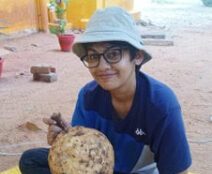June 30, 2023

Ammel Sharon
The QAMRA Archival Project is concerned with the nature of record-keeping in postcolonial India. Records in the postcolonial state archives from the 1980s onward will determine what future historians will base their studies on for this time period. Anticipating a dearth of rich documentation in the state archives, we wish to think about what records independent archives might keep, bearing in mind historiographical turns since the 1960s including the cultural turn, everyday history, the ecological turn, queer-trans-feminist interventions, or science and technology studies.
To explore these archival concerns, QAMRA and the Centre for Labour Studies, NLSIU, hosted a discussion with Profs. Janaki Nair, Kamala Sankaran and Babu Mathew on documenting working lives on 2 May 2023. Each was asked to speak of their scholarship on labour in the context of their personal journeys in/with labour movements. We were delighted to see a full-house at this campus event, with many old-timers in the labour movement turning up that evening to listen to their comrades.
Prof. Janaki Nair retired as historian at JNU, and her path-breaking and methodologically innovative works include Miners and Millhands (1998), The Promise of the Metropolis (2005), Mysore Modern (2011). Prof. Nair presented the different ways in which historians of labour have gone beyond studying collective action and the workplace.
Prof. Kamala Sankaran is Chair Professor at NLSIU and her works include Freedom of Association in India and International Labour Standards (2009), Challenging the Legal Boundaries of Work Regulation (2012) and Affirmative Action: A View from the Global South (2014). Prof. Sankaran introduced the audience to leaders of various trade unions, whom she had interviewed decades ago. She also spoke of the different archives she had accessed for her labour research.
Prof. Babu Mathew is former Registrar and faculty at NLSIU. He was Country Director of ActionAid International in India. He has been closely involved in collective bargaining processes at both national and local level, as chief negotiator on behalf of workers. He was also Vice- President of Trade Union International for two terms. Prof. Mathew shared his experiences, as a lawyer and trade unionist, in the public sector and private sector industries.
This event was dedicated to the memory of historian Ranajit Guha (1923-2023), who, with a younger generation of scholars, developed a remarkable new reading of the colonial archive that came to be called Subaltern Studies. He exhorted us, in the essay ‘Chandra’s Death’, to bend to the ground and take seriously the fragmentary record which comes to us without context.
Given the rich discussion, and potential suggested for further research, QAMRA has made available a lightly edited, complete transcript of the event here.

